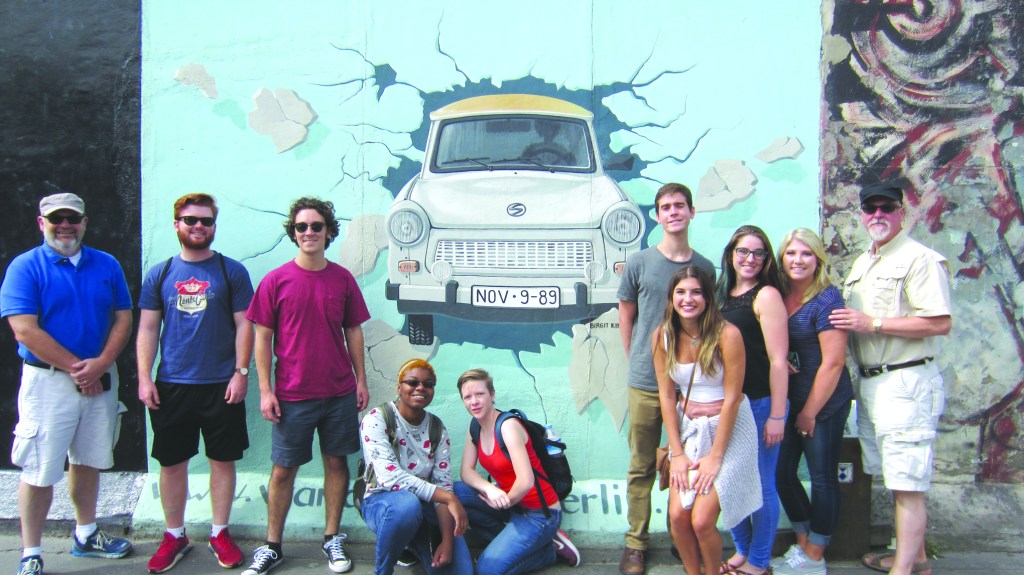GC students get study little-known aspect of German history
Published 3:03 pm Friday, August 11, 2017

- Ken McGill, Jake Carter, Jacob Handley, Tykia Lumpkin, Sherri Simmons, Andrew Denning, Annie Jackson, Sam Segars, Jenna Lee and Ron Fietkau all pose in front of the iconic image of a trabi breaking through the Berlin Wall during the group’s study abroad trip to Germany. Students visited several different historical and cultural sites during their five-week trip, and they also got the opportunity to learn about the several Germans’ contributions to the scientific community.
MILLEDGEVILLE, Ga. — When many people think of Germany, they often think of a place rich in culture and history.
With monuments detailing the country’s dark past involving the Holocaust and a once-divided capital city to the rich cultural experiences provided by Oktoberfest and native German cuisine, it is often easy for people exploring the country to overlook the importance it has had in helping to advance the scientific community.
But for five weeks this summer, students from Georgia College and five other universities around the state took a study abroad trip to Germany to unearth its rich scientific history and learn about the contributions of several German scientists.
And despite it being many of the students’ first time learning about Germany’s many contributions to the scientific community, Ken McGill, one of the professors who went on the trip and taught a course on German science history, said this specific study abroad program has been introducing students all over the state to this seldom-emphasized aspect of German history for six years.
“The European Council has been around for a long time, but our association with it started about 10 years ago. We ran the first class, a history of German scientists class, in Berlin six years ago,” said McGill, chair of GC’s chemistry, physics and astronomy departments. “Most people don’t think about scientists when they think about study abroad classes. Instead they tend to think about the humanities and going to art museums, so when we first started the class we thought nobody would want to go abroad for science, but it ended up being one of the biggest classes we took over.”
One of the main reasons the program chose to host the program in Germany is due to the fact that the world’s first research university, Humboldt University, is located in Berlin. The school, which was founded in 1810, boasts several Nobel Prize-winning alumni in the fields of chemistry, physics, medicine, and even literature.
And besides hosting so many brilliant scientific minds, like Albert Einstein and Gustav Ludwig Hertz, McGill said the school also helped lay the groundwork for many of the universities we have in the United States today.
“Humboldt University really set the model for the universities that we have in the U.S.,” said McGill. “If you think about what we have going on here at that time, Reconstruction was going on around 1865, and land-grant universities were going up everywhere around the country, and they all were following this research university model that Humboldt started.”
Along with allowing students to see the historic school, McGill also taught a class centered around the history of German scientists that he hoped would give the students in his class a new perspective on the evolution of science.
“The biggest thing we were looking for was to give the students a perspective of how science has evolved,” said McGill. “I think a lot of times the world and people in general and students think we’ve always just known this stuff, and all these great scientists like Einstein were just brilliant and always right. But what you learn by learning about their history is their personal lives. Most of these scientists, like Newton who believed in transmutation, were wrong and flawed just like everybody else.”
Besides McGill’s class on German scientists, students were also given the opportunity to take a class that focused on European countries’ various ways of being energy efficient by using renewable energy.
“I learned a lot in renewable energy class, and I may have liked that class more because it’s very applicable. It’s something that anybody can understand and apply to their life,” said Jenna Lee, a senior chemistry major at GC. “When we took our trip to Gutenberg, we saw all kinds of windmills on the land we passed by and solar panels were everywhere you went. When you compare it to us here, you see that it’s drastically different. You do see some renewable energy here, but not nearly as much as in Germany. We’re a very spoiled country when it comes to the using of energy.”
Along with energy conservation and using renewable energy, Lee also said that she noticed there was a greater emphasis on recycling in Germany too. There, she said that most of the drinks people bought were in bottles, and they could put the bottles back in recycling machines for cash or a credit that could be used toward future purchases.
“It’s definitely an incentive that we could use to get people to recycle, especially with college students,” said Lee. “College students would definitely want that money back. I don’t think we could be as energy efficient as Germany because our weather and culture is different, but we could make little changes, like the recycling incentive. And maybe it doesn’t matter as much right this second, but it definitely matters for the future.”
Aside from learning so much in the classroom about Germany’s scientific history and its efforts to conserve energy today, Lee said her time outside the classroom was equally as valuable as her time inside it. With classes only happening four days per week, the students in the program had the opportunity to take an extended three-day weekend each week to explore Berlin and the country as a whole.
“The students were definitely very adventurous in their exploration,” said McGill. “We had some go to Rome, Paris, Prague and Switzerland. Everything is public transportation, and a lot of people did get on the trains. But if you get to Europe, you can fly anywhere else in Europe for 100 euros.”
Even though several students took the opportunity to explore other countries in Europe, Lee said that she thought that since she was studying in Germany, she really wanted to take her time to stay there and really soak up the culture.
“I went to Rhine Valley, and that was absolutely gorgeous,” said Lee. “There were castles and vineyards everywhere, and it was absolutely beautiful.”
Along with getting to see many of the castles and other scenery around the country, the students in the program also visited the Wittenberg Castle church where Martin Luther nailed his 95 Theses to the church door, as well as got to see the art on the Berlin Wall and go through Checkpoint Charlie, the famous spot where people used to cross the Berlin Wall.
Lee also said she and others in the program got their fill of native German cuisine, as Döner Kebabs from a restaurant near their hotel were often a go-to meal. Comprised of lamb on a big chunk of pita bread with lettuce, cabbage, onions, tomatoes and a garlic sauce stuffed inside, McGill said the students often made a meal out of this for only 3.50 euros.
“I had probably 25 of them the entire time I was there,” said Lee. “We had a habit for over a week where we’d go every night and get one for dinner. That’s on the top of the list of what I miss most about Germany.”
And despite speaking no German before arriving in Germany, Lee said she had very little trouble communicating to native Germans, as many people there spoke English in the shops and restaurants they went in. But for McGill, who knew a little German upon arriving, one experience left him wishing he had a better grasp on the language.
With Berliners being known for being grumpy people who generally do not speak in passing the way Southerners often do, McGill said he was at the laundromat one day and hoped to just blend as another angry Berliner in and not have to try and hold a conversation with anyone.
“I was hoping to fake it like I was a grumpy Berliner, but this woman sat down next to me, and the only English she knew was, ‘I am an old woman,’” said McGill. “I figured out she was 89 years old, and I did my calculations back and found out she was 17 at the end of World War II. When Germany invaded Poland, she was 14 I think, so she lived through all that stuff. I think she ended up being in East Berlin after the war, so she was part of the reconstruction, and she talked about how she was a nurse. I really wish my German was better so that we could have had a great conversation.”
And despite Berliners being characterized as a prickly group of people, McGill and Lee both said that people were friendly and welcoming.
“People are worried these days with traveling and immigration about all the stuff you see in the press, but they were very welcoming and friendly folks,” said McGill. “It was a really great experience. We were in every neighborhood, and it seemed like you saw every religion on the planet and heard every language on the planet, but I never felt any danger.”
But even though Lee and McGill enjoyed their experiences abroad, both said there were parts about being home, like free refills and ice in their drink, that they missed after being in a foreign country for five weeks.
“My German is very iffy. What I missed most was being able to walk up to someone and having a conversation without struggling through it with trying to speak German or wondering if the other person spoke English,” said McGill. “It was nice just to get back and have a comfortable easy conversation.”





